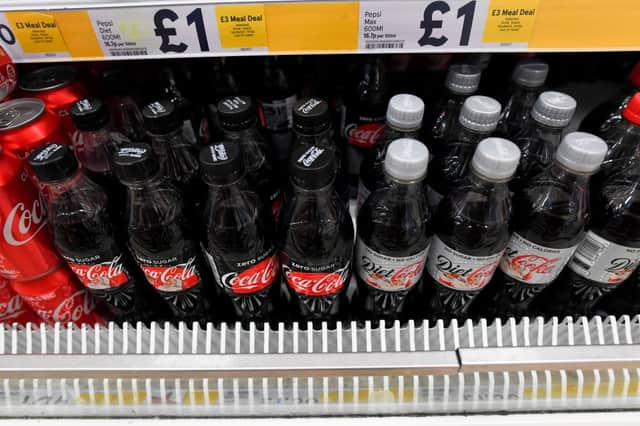Aspartame: popular sweetener used in diet soft drinks to be labelled possible carcinogen - WHO to announce
and live on Freeview channel 276
A popular sweetener used in diet soft drinks and other products could be a possible carcinogen, the World Health Organization is expected to announce.
Reuters have reported that the WHO are expected to release the findings of an investigation into Aspartame next month. Two sources "with knowledge of the process" told the news agency that the sweetener will be declared a potential cancer risk - pitting the global health body against the food and drink industry.
Advertisement
Hide AdAdvertisement
Hide AdAspartame will be listed as "possibly carcinogenic to humans" by the International Agency for Research on Cancer (IARC), the WHO's cancer research arm, in July, according to reports. The sweetener is used in a range of products from Diet Coke to Mars' Extra chewing gum.
It is the first time that the sweetener will be labelled a potential carcinogen with previous studies finding no association between it and cancer. The The European Food Safety Authority (EFSA), Food and Drug Administration (FDA) and the National Cancer Institute have all said that aspartame is safe for human consumption in the past.
Here's all you need to know:


What is the WHO report expected to say?
The IARC will release its ruling in July, according to Reuters sources. It was finalised earlier in June after a meeting of external experts having been through all the published evidence. Aspartame is expected to be labelled a potential carcinogen - meaning it carriers a risk of possibly causing cancer in humans.
The ruling will not take into account how much human's can potentially safely consume. The Joint WHO and Food and Agriculture Organization's Expert Committee on Food Additives (JEFCA) are also reviewing aspartame's use this year and they are the part of WHO which issues advice for individuals.
Advertisement
Hide AdAdvertisement
Hide AdReuters reports that an IARC spokesperson said both the IARC and JECFA committees' findings were confidential until July, but added they were "complementary", with IARC's conclusion representing "the first fundamental step to understand carcinogenicity".
Concerns about confusion among the public
Reuters also reports that letters from U.S. and Japanese regulators raise concerns that holding both processes at around the same time could be confusing.
According to the news agency, Nozomi Tomita, an official from Japan's Ministry of Health, Labour and Welfare, wrote in a letter on 27 March: "We kindly ask both bodies to coordinate their efforts in reviewing aspartame to avoid any confusion or concerns among the public."
Food and Drink industry claim ruling is based on "widely discredited research"
Advertisement
Hide AdAdvertisement
Hide AdThe IARC has in the past faced criticism for sparking "needless" alarm with prior rulings. It has for example listed working overnight and consuming red meat in the "probably cancer-causing" class and listed using mobile phones as "possibly cancer-causing".
Frances Hunt-Wood, the secretary general of the International Sweeteners Association (ISA), said: “IARC is not a food safety body and their review of aspartame is not scientifically comprehensive and is based heavily on widely discredited research.”
Responding to the report, Kate Loatman, executive director of the International Council of Beverages Associations, said: “While it appears the IARC is now prepared to concede that aspartame presents no more of a hazard to consumers than using aloe vera, public health authorities should be deeply concerned that this leaked opinion contradicts decades of high-quality scientific evidence and could needlessly mislead consumers into consuming more sugar rather than choosing safe no- and low-sugar options – all on the basis of low-quality studies.
“Even the IARC agrees it is not the appropriate authority to undertake risk assessment based on actual consumption and that it ‘does not make health recommendations’.
Advertisement
Hide AdAdvertisement
Hide Ad“We remain confident in the safety of aspartame given the overwhelming weight of scientific evidence and positive safety determinations by food safety authorities in more than 90 countries around the world.
“We, therefore, welcome the broader, more comprehensive food safety review underway by the WHO and the UN Food and Agriculture Organization Joint Expert Committee on Food Additives.”
What is aspartame?
It is an artificial non-saccharide sweetener and is said to be 200 times sweeter than sucrose. It was first submitted for approval as a food ingredient in 1974 and was approved by the FDA in 1981.
Aspartame has been used as a substitue for sugar in a wide range of products for over 40 years - including in Coca-Cola's Diet Coke products. Clinical trials in 2017 showed that using aspartame in place of sugar reduces calorie intake and body weight in adults and children.
Comment Guidelines
National World encourages reader discussion on our stories. User feedback, insights and back-and-forth exchanges add a rich layer of context to reporting. Please review our Community Guidelines before commenting.